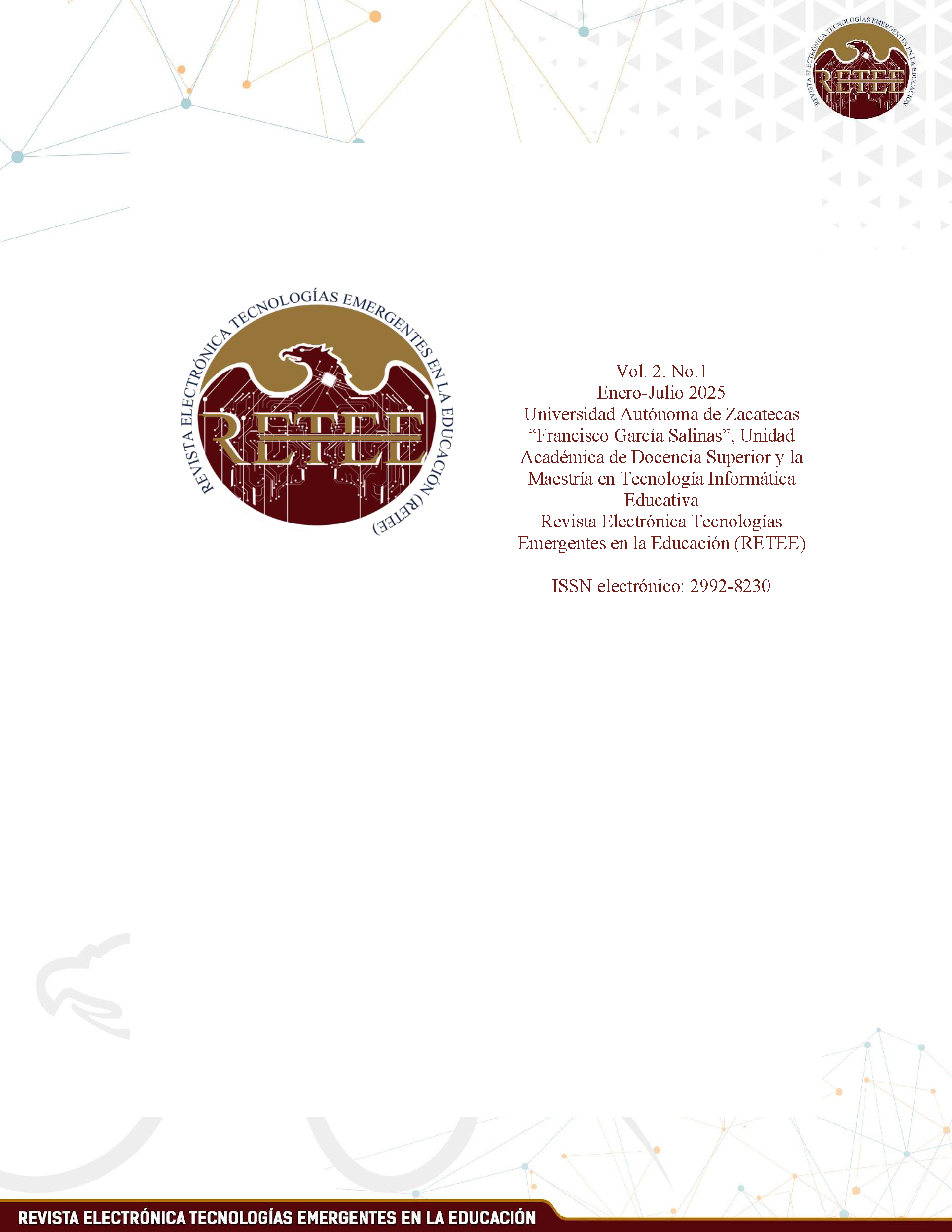Research skills in virtual learning environments at the undergraduate level: a systematic review
Published 2025-06-30
Keywords
- Research skills,
- virtual learning environments,
- undergraduate level
Copyright (c) 2025 Rafael Dena Salazar, Miguel Ángel González Villegas

This work is licensed under a Creative Commons Attribution 4.0 International License.
How to Cite
Abstract
The main purpose of this study is to identify the current state of research on investigative skills (IS) in virtual learning environments (VLEs) at the undergraduate level. The research was conducted using a qualitative and interpretative documentary design, which determined the procedure for selecting, accessing and recording the documentary sample. To select the documents, a search was carried out on Google Scholar, as well as in various academic databases and indexed repositories (Dialnet, Latindex, Redalyc and Scielo) in the period 2019-2024. The method used was qualitative, based on documentary analysis through systematic review proposed by the PRISMA statement. The main results show that HI can be developed through the use of AVEs, mainly on the Moodle platform, and that the predominant epistemological perspective in the studies analysed is positivist. Social constructivism and connectivism stand out as the most frequent theoretical foundations. These findings underscore the importance of integrating VLEs into research training, demonstrating that virtual platforms such as Moodle enable students to collaboratively develop research tools, analyse data, write scientific documents, learn citation rules, critically analyse scientific articles and present results in forums, chats and videoconferences, in the context of online courses or distance learning.
Downloads
References
- Alfaro-Saavedra, M. N., Paucca Gonzales, N., Cóquel Orihuela, L. K., Méndez Ilizarbe, G. S., Roque Rivera, I. L., & Rafayle Cuadra, R. J. (2022). Enseñanza virtual y desarrollo de competencias investigativas. Revista Horizontes, 6(25), 317–332. https://doi.org/10.33996/revistahorizontes.v6i25.428
- Aristovnik, A., Karampelas, K., Umek, L., & Ravšelj, D. (2023). Impact of the COVID-19 pandemic on online learning in higher education: a bibliometric analysis. Frontiers in Education, 8, 1225834. https://doi.org/10.3389/feduc.2023.1225834
- Arreola, A., Palmares, G. y Ávila, G. (2019). La práctica pedagógica desde la socioformación. RAES, 11(18), pp. 74-87. https://dialnet.unirioja.es/servlet/articulo?codigo=7004446
- Bates, A. W. (2015). Teaching in a digital age: Guidelines for designing teaching and learning. BCcampus. https://pressbooks.bccampus.ca/teachinginadigitalagev2/
- Castro-Rodríguez, Y. (2020). Desarrollo de competencias investigativas en estudiantes de las Ciencias de la Salud: Sistematización de experiencias. Duazary, 17(4), 65–80. https://doi.org/10.21676/2389783X.3602
- Chirino, M. V. (2002). Perfeccionamiento de la formación inicial investigativa de los profesionales de la educación. (Tésis inédita de doctorado). Instituto Superior Pedagógico Enrique José Varona, La Habana, Cuba.
- Flores-Paredes, A., Inca, H., Gutiérrez, C., Yucra, E., Ari, A., Bustinza, S., y Chambi, J. (2025). Eficacia de un programa de empoderamiento académico en el desarrollo de habilidades investigativas en estudiantes de pregrado de una universidad pública de Perú. Retos, 62, 1117–1125. https://doi.org/10.47197/retos.v62.110753
- Guerra, F.E., y Naranjo, M.E., (2020). La formación investigativa en los estudiantes de licenciatura en Educación Básica. Caso Universidad Técnica del Norte, Ecuador. Delectus, 3(3), 67-80 https://doi.org/10.36996/delectus.v3i3.55
- Guerrero, M. E. (2007). Formación de habilidades para la investigación desde el pregrado. Acta Colombiana de Psicología, 10(2), 190-192. http://www.scielo.org.co/pdf/acp/v10n2/v10n2a18.pdf
- Gutiérrez Alcalá, R. (2021, May 11). Las claves de la Nueva Ley General de Educación Superior. Gaceta UNAM. https://www.gaceta.unam.mx/ley-general-de-educacion-superior-a-punto-de-entrar-en-vigencia/
- Ley General de Educación Superior [LGES]. Diario Oficial de la Federación, 20 de abril de 2021. México. https://www.diputados.gob.mx/LeyesBiblio/pdf/LGES_200421.pdf
- López-de Parra, L., Polanco-Perdomo, V., y Correa-Cruz, L. (2017). Mirada de las investigaciones sobre formación investigativa en la universidad latinoamericana: estado del arte (2010-2017). Revista de Investigación, Desarrollo e Innovación, 8(1), 77-95. https://revistas.uptc.edu.co/index.php/investigacion_duitama/article/view/7371/5831
- Mármol, M., Conde, E., Cueva, J., y Sumba, N. (2022). Desarrollo de habilidades investigativas en estudiantes de Educación Superior a través de neuroeducación. Praxis Pedagógica, 22(32), 141-174. http://doi.org/10.26620/uniminuto.praxis.22.32.2022.141-174
- Moreno Bayardo, M.G. (2005). Potenciar la educación. un currículum transversal de formación para la investigación. REICE. Revista Iberoamericana sobre Calidad, Eficacia y Cambio en Educación, 3(1), 520-540. http://www.redalyc.org/articulo.oa?id=55130152
- Page, M. J., McKenzie, J. E., Bossuyt, P. M., Boutron, I., Hoffmann, T. C., Mulrow, C. D., Shamseer, L., Tetzlaff, J. M., Akl, E. A., Brennan, S. E., Chou, R., Glanville, J., Grimshaw, J. M., Hróbjartsson, A., Lalu, M. M., Li, T., Loder, E. W., Mayo-Wilson, E., McDonald, S., McGuinness, L. A., … Moher, D. (2021). The PRISMA 2020 statement: an updated guideline for reporting systematic reviews. BMJ (Clinical research ed.), 372, n71. https://doi.org/10.1136/bmj.n71
- Rodríguez, A.F., Posso, R.J., de la Cueva, R.R., y Barba, L.C. (2018). Herramientas metodológicas para el desarrollo de habilidades investigativas: en los estudiantes: una praxis necesaria. OLIMPIA. Revista de la cultura física de la universidad de Gramma, 15(50). 119-132. https://dialnet.unirioja.es/servlet/articulo?codigo=6578678
- Rojas, C., y Aguirre, S. (2015). La formación investigativa en la educación superior en América Latina y el Caribe: una aproximación a su estado del arte. Revista Eleuthera, 12, 197-222. http://vip.ucaldas.edu.co/eleuthera/downloads/Eleuthera12_11.pdf
- UNESCO. (2000). Declaración mundial sobre la educación superior en el siglo XXI: visión y acción. Educación Media Superior, 14(3), 253-269. http://scielo.sld.cu/pdf/ems/v14n3/ems06300.pdf
- UNESCO. (2015). Informe de la UNESCO sobre la ciencia: hacia 2030 (Resumen ejecutivo). Ediciones UNESCO.
- Valenzuela, M., Valenzuela, A., Reynoso, O., & Portillo, S. (2021). Habilidades investigativas en estudiantes de posgrado en educación. Dilemas Contemporáneos: Educación, Política y Valores, 8(–), 2766. https://doi.org/10.46377/dilemas.v8i.2766
- Yaques, M.R., Navas, A.I., Peña, J.M., y Peña, A. (2023). Las habilidades investigativas. Una lógica sistematizada para la Formación de competencias profesionales en la educación superior. Ciencia y Educación, 6-17. https://www.cienciayeducacion.com/index.php/journal/article/view/210
- Page, M. J., McKenzie, J. E., Bossuyt, P. M., Boutron, I., Hoffmann, T. C., Mulrow, C. D., ... & Alonso-Fernández, S. (2021). Declaración PRISMA 2020: una guía actualizada para la publicación de revisiones sistemáticas. Revista española de cardiología, 74(9), 790-799. https://doi.org/10.1016/j.recesp.2021.06.016
- Zawacki-Richter, O., & Latchem, C. (2018). Exploring four decades of research in Computers & Education. Computers & Education, 122, 136-152. https://doi.org/10.1016/j.compedu.2018.04.001


